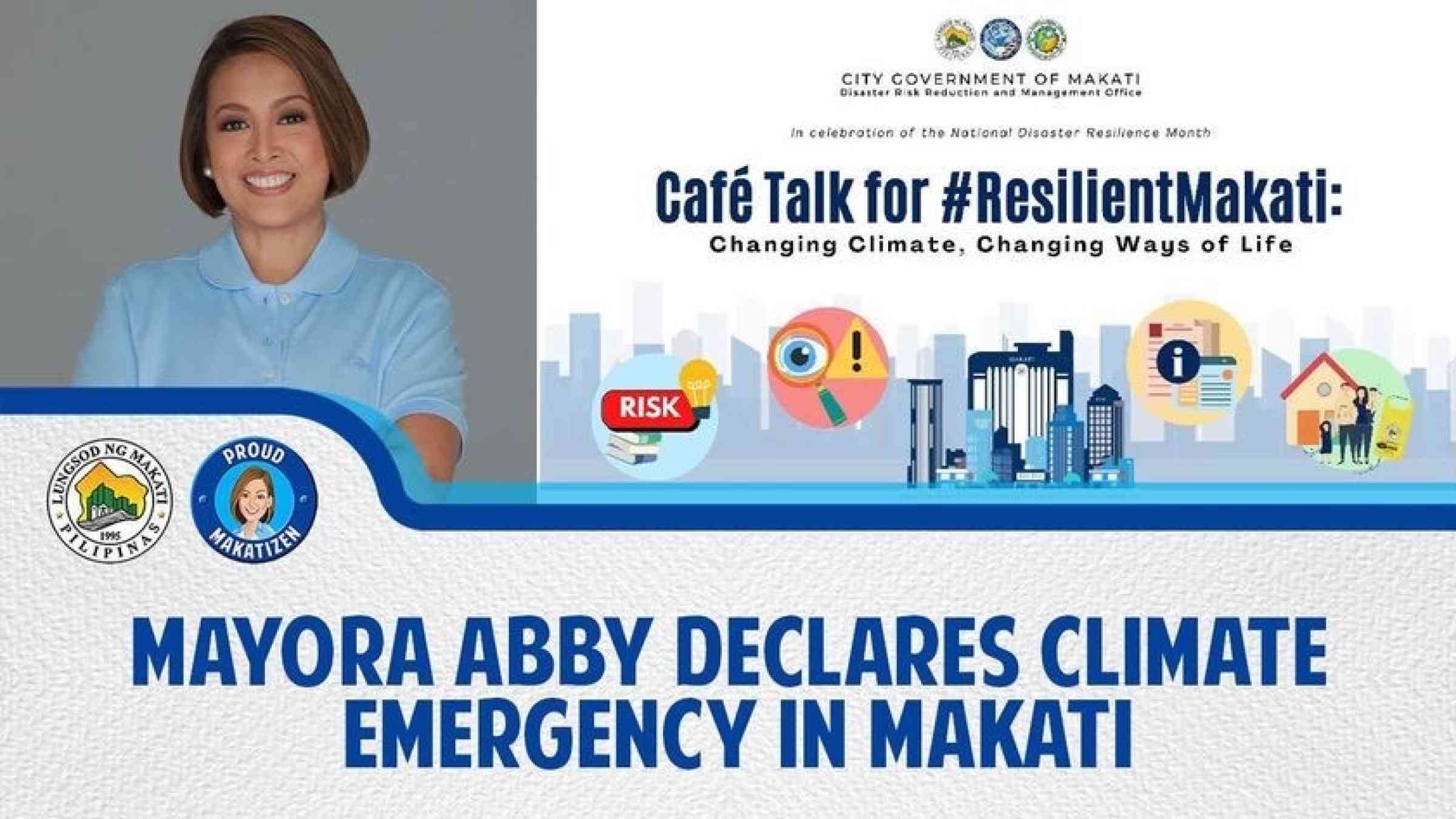Makati steps up on climate

The ninth feature in this Making Cities Resilient 2030 series, under the theme ‘From Risk to Resilience: Building a Local Climate of Success’, profiles Makati, in Philippines
As the Philippines’ business capital, Makati City goes from a city of 600,000 residents to one of 5 million each day. With a robust economy and growing business opportunities, Makati is a hub for entrepreneurs, investors, and business owners. On August 5, 2022, Makati declared a climate emergency, calling for much-needed environmental reform. In response, the city has implemented many initiatives to reduce carbon emissions, promote renewable energy and conservation, and create green jobs. The purpose of the climate emergency declaration was to place climate urgency at the center of all policy and decision-making in the city. On average, 20 typhoons hit the Philippines each year, and the storms are becoming more intense and unpredictable.
Making Climate Action a Priority
Makati Mayor Abby Binay said the declaration fires the starting gun on efforts to green and transform the local economy, strengthening the protection of citizens and the city’s infrastructure assets and systems. ‘As temperatures and sea levels continue to rise, low-lying coastal areas in cities like Makati have become more vulnerable to strong typhoons that bring floods and landslides. This will result not only in the disruption of public services but also the displacement of families and even entire communities,’ Mayor Binay said. ‘We have heard the data. We have understood the science, and we are feeling its impact. Now is a crucial time to act, and we must act fast. We need thinkers, doers, and movers. We are calling on everyone to come together and act now. We must ensure a whole-of-society approach in combating climate change.’
Makati is also making strides in implementing ‘green infrastructure’ such as solar panel roofs on government buildings and public transport projects encouraging the use of electric vehicles. In addition, the city has enacted many incentives and subsidies to promote eco-friendly businesses in Makati. Makati City has placed great importance on sustainable tourism as well. The city’s approach is to engage with residents and businesses in raising awareness about the impacts of climate change, and to involve them in formulating resilient and sustainable development plans.
Climate-Proofing Businesses
Makati regards the private sector as a critical partner. ‘To climate-proof business growth in the city, we will strengthen collaboration with the business community for the effective implementation of green policies,’ Mayor Binay said. “We will finalize our Investment and Incentive Code which aims to incentivize green investments and practices and thereby encourage the business sector to take an active role in attaining the city’s climate goals.” The city's main financing instruments are grants, loans, and equities. Mobilizing private capital, primarily through public-private partnerships, has helped to bridge adaptation financing gaps for major projects. Adaptation finance has also been incorporated into core administrative policies. As part of the city’s Annual Investment Program, Makati has allocated a budget to increase local resourcing of adaptation initiatives.
The city’s ambitions are built upon a well-established integrated, inclusive governance system. Under the overall Comprehensive City Development Plan, the city’s Comprehensive Land Use Plan makes provisions for incentives to promote flexible, innovative, and disaster-resilient planning and action in the development process. These include policy formulation, land use and urban planning, infrastructure, and housing, solid waste management, among others. The plans are ‘actioned’ through institutional arrangements that prioritize a multi-stakeholder approach that engages the business sector, civil society, academia, national government, and city authorities.
Promoting a Sustainable Lifestyle
Two flagship initiatives are moving forward. First, Makati plans to introduce electric buses as part of a smart public transport system, with the support of the Korea International Cooperation Agency (KOICA). The new fleet will improve mobility and reduce greenhouse gas emissions. Second, Makati wants to be a pioneer municipality in the Philippines in using renewable energy to power public schools and local government offices. It is installing solar panels in schools and using them will reduce energy consumption and costs in the country’s premier financial district. Installation is being rolled out to its 25 elementary schools, ten junior high schools, and eight senior high schools in batches, with Comembo Elementary School one of the first to go green.
In terms of mentoring other cities in the Philippines and internationally, Makati has a strong track record. In October 2022, the city helped guide two other Philippines cities (Baguio and Ormoc) to conduct risk assessments as a basis for disaster and climate risk planning. The city is also committed to expanding its open-source Makati DRRM Knowledge Portal and integrating tools and resources from the Making Cities Resilient 2030 global collaboration into its DRRM Academy. Makati City is a leader in climate resilience, not only for its citizens but for others around the globe. Its commitment to sustainable and resilient development is an example of how cities can shape their futures and benefit people across the planet. With this in mind, Makati City stands ready to continue its journey towards a more climate-resilient future.

